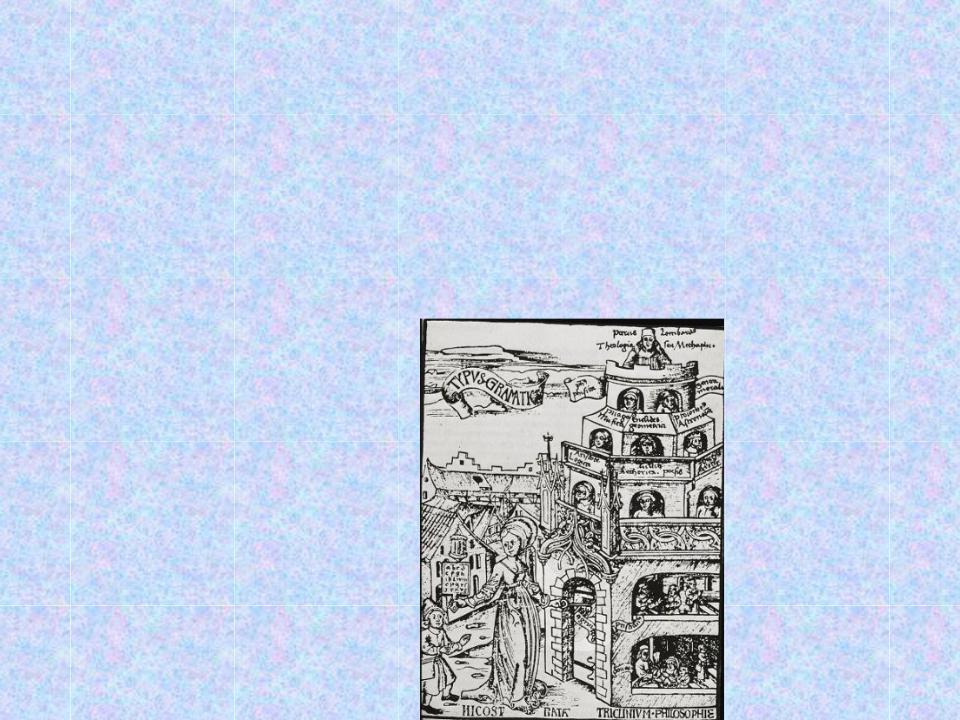
- •Medieval philosophy
- •Chronological framework:
- •However, when and how to begin the Middle Ages, is still controversial for
- •The philosophy of this period had two main sources of its formation. The
- •The second source is the Holy Bible, turning this philosophy into the mainstream
- •However, in a strict religious dictatorship, supported by state power, philosophy was declared
- •Medieval philosophy has developed five core principles:
- •1.Theocentrism (Greek theos - God) – in the center of the universe is
- •3.Providentialism is the idea that destinies of the world and man are determined
- •5. Personalism is the principle according to which man is created in image
- •The first stage of the medieval Christian philosophy is apologetic (II-III cc.).
- •Apologetic period, coming after the apostles, gives us a number of well-known Christian
- •Justin first gave Christianity the concept of Greek philosophy and laid the foundation
- •In the emerging theology
- •Patristics.
- •Origenes Adamantius
- •Aurelius Augustinus - St. Austin (354-430). The ancestor of the Christian philosophy of
- •God created matter and endowed (наделить) it with different shapes. Evil is the
- •Scholasticism is a systematic medieval philosophy, centered around universities and is a synthesis
- •Scholasticism is characterized by two trends: the realists and nominalists.
- •According to nominalism, common concepts are only the names (Johannes
- •Five reasons (proofs) of God’s existence:
- •Works of Thomas:
- •Arab-Muslim philosophy
- •The main question during the development of Islamic dogma, was the question of
- •As a philosophical problem unity of being was discussed in two plans: the
- •Rationalism of Islamic philosophy was expressed in the development of special teaching –
- •Among them there were two basic directions: Ascharites (followers Ashari’s theology) and Mu'tazila.
- •Mutasillits shared attributes of God to “attributes of the self” (Ift az-zat) and
- •Asharizm, which became the main school of Kalam in X cent., is solution
- •Falsafa (Eastern peripatetism) is a direction of secular philosophy in classical Islam, which
- •Al-Kindi (801-873), (philosopher of Arabs) has formulated the main questions:
- •the interpretation of creation as granting the existence of things with a kind
- •Abu Nasr al-Farabi (873- 950)
- •People are attached to the truths by two ways: by using apodictic judgments
- •The need for religion related to the needs in Political Science and Law.
- •Ibn Sina (Avicenna) (980- 1037) - Central Asian philosopher and physician, a representative
- •Ibn Sina proved co-eternity of the world with the Creator. Creation in eternity
- •According to him, absolute truth can be comprehended by intuitive vision which presents
- •Ibn Bājjah (Avempace)
- •Ibn Rushd (Averroes)
- •Ibn Khaldun (1332- 1406).
- •He has created a theory of social development from the lowest level (barbarism)
- •A mystical form of Islam expressed in such a direction as Sufism. Fundamentals
- ••However, Sufism has been developed in the esoteric concepts of al-Hallaj (I am

Medieval philosophy

Chronological framework:
•Beginning of the Middle Ages refer to II-IV centuries A.D.
•Completion of the Middle Ages is to XII-XIII centuries.

However, when and how to begin the Middle Ages, is still controversial for historians of philosophy.

The philosophy of this period had two main sources of its formation. The first is the ancient Greek philosophy, especially in its Platonic and Aristotelian traditions.

The second source is the Holy Bible, turning this philosophy into the mainstream of Christianity. Christianity (from the Greek word Christos – “Anointed One”, “Messiah”) originated as one of the sects in Judaism in the I A.D. in Palestine.

However, in a strict religious dictatorship, supported by state power, philosophy was declared as a ancilla theologiae
theology”)

Medieval philosophy has developed five core principles:
theocentrism,
creationism,
providentialism,
personalism,
revelationizm.

1.Theocentrism (Greek theos - God) – in the center of the universe is God.
2.Creationism is the idea that the world and mankind created by God.

3.Providentialism is the idea that destinies of the world and man are determined by God.
4.Revelationizm is a principle that there are two ways of revelation: Holy Bible and sacred tradition.

5. Personalism is the principle according to which man is created in image and similarity of God, but because of the Fall man he has lost his likeness, retaining only the
God.
